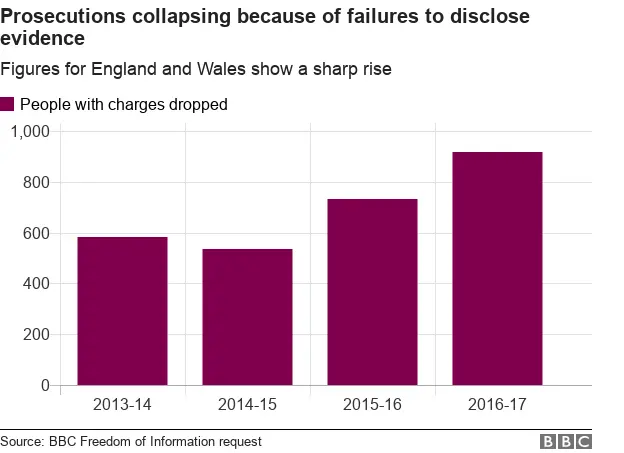Hundreds of cases dropped over evidence disclosure failings
The number of prosecutions in England and Wales that collapsed because of a failure by police or prosecutors to disclose evidence increased by 70% in the last two years, the BBC can reveal.
Last year, 916 people had charges dropped over a failure to disclose evidence - up from 537 in 2014-15.
It comes after recent collapsed rape cases highlighted a failure to share evidence with defence solicitors.
The Crown Prosecution Service said the justice system had "systemic" problems.
In the lead up to criminal trials, police and prosecutors have a duty to disclose evidence that might either assist the defence case or undermine the prosecution's.
However, the recent collapse of several rape cases has heightened concerns that evidence is not being disclosed early enough, and that the rules are not being followed.
In December, the trial of Liam Allan, who faced 12 counts of rape and sexual assault, was halted.
The case against Mr Allan was dropped when it emerged evidence on a computer disc - which police had looked through - showed messages from the alleged victim pestering him for "casual sex".

Last week, a rape charge against Oxford University student Oliver Mears was dropped on the eve of his trial, after a diary which supported his case was uncovered.
Surrey Police admitted its investigation had been flawed and launched an internal review.
Surrey's Chief Constable Nick Ephgrave told BBC Radio 4's Today: "For too long disclosure has been seen by many officers as something that is subsequent to an investigation, ie. an administrative process at the end, rather than something that should be integral."
He acknowledged it was "no small task" to train the police force to think differently, but an improvement plan would be published shortly.

Analysis
By BBC home affairs correspondent Danny Shaw
Suddenly, disclosure is a hot topic. It used to be seen as a rather dry part of the trial process which no one quite understood.
Occasionally, there would be a headline about a miscarriage of justice because evidence was not disclosed; a review would be set up with a promise that "lessons will be learned", before the issue disappeared again.
But the recent spate of collapsed rape prosecutions has highlighted that disclosure is not some theoretical concept but a vital legal procedure that affects people's lives.
The CPS figures demonstrate that these are not isolated cases and although the number of disclosure-related failed prosecutions is comparatively small, it is increasing.
There have been three official reports into disclosure in seven years (Lord Justice Gross, Richard Horwell, CPS inspectorate) but only now, it seems, is there a determination among police and prosecutors to grip the issue.

Jerry Hayes, the prosecuting barrister in Liam Allan's case, fears innocent people were "probably" being jailed because of disclosure failings.
"And it may have been some time ago and it may well be that evidence is destroyed. Their lives are now destroyed," he told the Today programme.
Julia Smart, defence counsel for Liam Allan, said she was not surprised by the BBC's figures, saying she and her colleagues believed "objective investigation" was not happening.
She said it was partly down to resources but police also needed to consider all possible lines of inquiry, not just focus on building up a case, and the prosecution should not be holding onto evidence.
Samuel Armstrong, an aide to Conservative MP Craig Mackinlay, was cleared by a jury of raping a woman after evidence was handed over just before his trial.
He said he and the woman had been drinking and dancing to jazz music before having consensual sex in the MP's Westminster office. The court heard the woman had given the story to journalists 15 hours after the pair had sex.
Mr Armstrong told BBC 5 live his message to director of public prosecutions Alison Saunders was: "You say that there is a problem and that you recognise it. You describe it as irritating and disappointing.
"For the young people involved it's much more - it's devastating," he said.
"If you think there's a problem, if you recognise that this is an issue, why don't you apologise to me, to Liam Allan and to all of the other young victims."
'Breaking point'
The new figures, obtained under the Freedom of Information Act, reveal the total number of people whose trials have ended or the charges against them dropped due to a failure to disclose evidence.

Over a four-year period, the number of completed prosecutions fell by almost 150,000 cases - from more than 736,000 in 2013-14 to just over 588,000 in 2016-17.
Angela Rafferty QC, chair of the Criminal Bar Association, blamed issues on a "lack of investment, training and attention to the criminal justice system".
She said barristers face "a daily struggle in respect of disclosure, delays and all the other disastrous consequences of a system that is openly described by MPs as at breaking point".
"The reasons for it must be properly explored and dealt with," she added.
She said Richard Foster, chairman of the Criminal Cases Review Commission, had written to the director of public prosecutions and the attorney general 18 months ago about the problem.
A CPS spokesperson said the number of dropped cases due to evidence disclosure failures represented just 0.15% of the total number of prosecutions.
"That is still too many, however, and we are clear that there are systemic disclosure issues across the criminal justice system which will require a collective effort in order to bring about improvement.
"Getting this right is a priority, and along with the police and other criminal justice partners we are working to improve how we fulfil these vital disclosure obligations."
Research by Patrick Cowling
